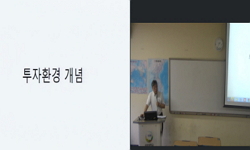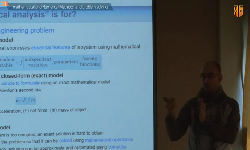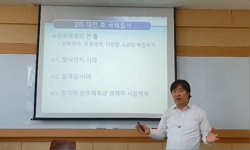Geopolitics has been a significant driving force in shaping global SF literary history since the 19th century, surpassing the influence of science and technology. However, its impact has been largely overlooked in Korean SF studies. In modern and cont...
http://chineseinput.net/에서 pinyin(병음)방식으로 중국어를 변환할 수 있습니다.
변환된 중국어를 복사하여 사용하시면 됩니다.
- 中文 을 입력하시려면 zhongwen을 입력하시고 space를누르시면됩니다.
- 北京 을 입력하시려면 beijing을 입력하시고 space를 누르시면 됩니다.
https://www.riss.kr/link?id=A108568507
-
저자
임태훈 (성균관대학교)
- 발행기관
- 학술지명
- 권호사항
-
발행연도
2023
-
작성언어
Korean
-
주제어
Geopolitical SF ; Choi In-hoon ; Lee Moon-yeol ; Ko Jong-seok ; Lee Hae-jo ; Iron World ; The Voice of the Governor(1967-1967) ; The General and the Doctor(2008) ; The General and the Doctor(1989) ; Extrapolation ; 지정학 ; SF ; 최인훈 ; 이문열 ; 고종석 ; 이해조 ; 철세계 ; 총독의 소리 ; 우리 고장에선 그렇게 말하지 않아! ; 장군과 박사 ; 외삽법
-
등재정보
KCI등재
-
자료형태
학술저널
- 발행기관 URL
-
수록면
81-118(38쪽)
- 제공처
-
0
상세조회 -
0
다운로드
부가정보
다국어 초록 (Multilingual Abstract)
Geopolitics has been a significant driving force in shaping global SF literary history since the 19th century, surpassing the influence of science and technology. However, its impact has been largely overlooked in Korean SF studies. In modern and contemporary Korean literary history, SF is often discovered and evaluated based on its relevance to science and technology, while the importance of SF in relation to the imagination spurred by the geopolitical conditions and crises of the Korean peninsula, surrounded by major powers, has not been fully acknowledged or investigated. This study aims to reveal the origins of various imaginative and historical movements incorporated into science fiction and the reasons behind the repeated stifling and overlooking of science fiction creation in South Korea. To achieve this, we propose a problem-setting framework called ‘Geopolitical SF’. This framework envisions potential wars, domestic and international security crises, and radical social changes in the future, based on the hegemonic plans and territorial constraints of major powers. The threshold of imagination that constrains both creators and readers also arises from geopolitical crises.
In the theoretical stage, we will first address three questions. Why should it be called ‘SF’ instead of ‘Science Fiction’? What specific evidence demonstrates the importance of ‘geopolitics’ in the early formation of SF? How does geopolitics both enable and suppress ‘extrapolation’ as a creative technique in SF? Subsequently, this paper will summarize the issues of ‘geopolitics’ present throughout Korean SF created and published during the colonial period while rediscovering the genealogy of 'Choi In-hoon's writing' from the perspective of geopolitical SF.
Through Choi In-hoon's 「The Governor's Voice」(1967-1976), Lee Moon-yeol's 「The General and the Doctor」(1989), and Ko Jong-seok's 「They Don't Say That in My Hometown!」(2008), we will explore the connections of ‘geopolitical SF’ in South Korean literary history. Engrossed in speculative writing experiments influenced by the gravitational pull of geopolitical fatalism, the Cold War, and colonialism on the Korean peninsula, Choi In-hoon's writing serves as a progress report on the impossible imagination and thought of the Korean peninsula from the emergence of colonial modern literature to the 1960s. Choi's writing deserves credit for the intermittent publication of science fiction in South Korean literary history, as it actively embraces geopolitical risks and underdevelopment complexes while confronting history and reality.
국문 초록 (Abstract)
‘지정학’은 19세기 이후 세계 SF 문학사의 형성 과정에서 과학기술 이상으로 중요한 발생 동인이었으나 한국 SF 연구사에선 외면받아온 주제였다. 한국 근현대 문학사에서 SF는 과학기술과...
‘지정학’은 19세기 이후 세계 SF 문학사의 형성 과정에서 과학기술 이상으로 중요한 발생 동인이었으나 한국 SF 연구사에선 외면받아온 주제였다. 한국 근현대 문학사에서 SF는 과학기술과의 관련성을 중심으로 발굴되고 평가받는 경향이 있다. 하지만 열강에 둘러싸인 한반도의 지정학적 조건과 위기로부터 추동된 상상력과 SF의 상관성은 그 존재감이 충분히 인식되지 못했고, 연구 역시 미진한 단계다. 이것은 SF에 혼융된 여러 상상력과 역사적 정동의 원류를 묻는 작업인 동시에, 남한에서 SF를 창작하는 일이 반복적으로 위축되고 우회할 수밖에 없는 이유를 밝히는 연구가 될 것이다. 이러한 문제 설정의 틀을 본 연구에선 ‘지정학적 SF’로 정의한다. ‘지정학적 SF’는 열강들의 패권 구도와 영토의 제약에 근거하여, 다가올 미래에 벌어질 수 있는 전쟁, 국내외 안보 위기, 그로 인한 급격한 사회 변동을 상상한다. 창작자와 독자 모두를 억압하는 상상력의 임계점도 지정학적 위기에서 비롯된다.
시론적 단계에선 세 질문에 우선 답한다. ① 어째서 ‘Science Fiction’이 아니라 ‘SF’라고 써야만 하는가? ② SF 초기 형성 단계에서 ‘지정학’의 중요성을 증명할 구체적 사실은 무엇인가? ③ 지정학은 SF의 창작 기법인 ‘외삽법’을 어떻게 활성화하는 동시에 억압하는가? 이어서 식민지기에 창작 발표된 한국 SF 소설을 관통하는 ‘지정학’의 문제를 정리하는 동시에, ‘최인훈적 글쓰기’의 계보를 지정학적 SF의 관점에서 재발견한다. 한반도의 지정학적 운명론, 냉전과 식민주의를 중력처럼 의식하며 사변적 글쓰기 실험에 몰두했던 ‘최인훈적 글쓰기’는, 식민지기 근대 문학 형성기부터 1960년대에 이르는 동안에 한반도에서 불/가능한 상상력과 사유에 관한 중간 결산 보고에 해당한다. 지정학적 리스크와 저개발 콤플렉스를 적극적으로 끌어안고 역사와 현실을 직시하는 SF가 남한 문학사에서 단속적(斷續的)으로나마 발표될 수 있었던 것 역시 ‘최인훈적 글쓰기’의 공이었다. 최인훈의 「총독의 소리」(1967~1976), 이문열의 「장군과 박사」(1989), 고종석의 「우리 고장에선 그렇게 말하지 않아!」(2008)를 통해 남한 문학사에서 ‘지정학적 SF’의 연결선을 발굴하고자 한다.
동일학술지(권/호) 다른 논문
-
- 반교어문학회
- 림성권
- 2023
- KCI등재
-
- 반교어문학회
- 정인숙
- 2023
- KCI등재
-
인과관계 연결어미 ‘-어서’, ‘-니까’의 의미 운율 사용 양상 연구
- 반교어문학회
- 유인선
- 2023
- KCI등재
-
베트남인 한국어 학습자의 지시 화행 수행 양상 연구 -협의대화의 시작 단계를 중심으로-
- 반교어문학회
- 안진
- 2023
- KCI등재





 KISS
KISS






